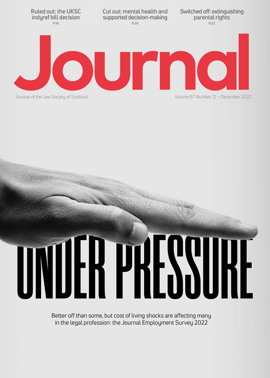Risk: Stress, workplace culture and risk factors

A time for reflection
The benefits of achieving that sometimes elusive work-life balance are well known. But it forms only a small part of the wider subject of health and wellbeing, topics very much in vogue, having received mass attention during the pandemic when many of us struggled with multiple lockdowns and all that entailed. No one could have envisaged the impact of the pandemic on our lives and wellbeing, and there is growing evidence that many have since experienced a decline in their mental and physical health and their ability to cope with everyday challenges.
The collective knowledge we have developed around this subject is vast, but of limited help unless it is implemented well. In that respect, the legal profession has typically been thought to have trailed behind other industries in furnishing its workforce with the tools to help achieve and maintain good physical and mental health while meeting client demands. Perhaps in recognition of this, the Law Society of Scotland’s new five-year strategy identifies a key priority as supporting its members to thrive by focusing on wellbeing resources to sustain positive mental health. Whether the profession’s governing body, an organisation’s managing partner or a newly qualified solicitor, we all share a responsibility to explore this issue and to do our part to encourage change.
As we emerge from the pandemic, we should take the time to reflect on what we have learned about health and wellbeing, and implement strategies which place it centre stage within our home and work lives.
Challenges facing the profession
The traditional model in which the legal profession operates is not necessarily conducive to our health and wellbeing and has, in many respects, acted as a barrier to the implementation of working practices and initiatives that may promote it effectively. Generally speaking, legal professionals must account for their working day and maintain a certain level of billable hours or income targets in order to achieve “success” within their firm. We have heavy workloads and tight deadlines. Clients can be demanding, and the competition to secure and retain them is fierce. More and more frequently, we deal with clients, and colleagues, who are international, operating from different continents and time zones. Conducting business digitally and remotely (even from an office environment) can create expectations that are increasingly difficult to manage.
Is it any wonder that Life In The Law, a study conducted by LawCare in 2020-21, found that 69% of legal professionals have experienced mental ill health? The study also found that burnout ranks high among the challenges faced by the profession, and this has perhaps never been more so than post-pandemic.
From an employee’s perspective, these types of challenge can lead to stress and anxiety. With that, comes a tendency to be more prone to making errors, both technical and in judgment. Without protecting our wellbeing, we can suffer from poor motivation and low morale. Such factors are often one of the underlying causes for behaviours such as excessive alcohol consumption and poor diet. These are just some of the many factors which can contribute to burnout, both physical and mental.
From a business perspective, there is constant pressure to maximise fee earning time, but performance is likely to dip when a workforce is not supported and motivated. Absenteeism and employee turnover may increase, stretching the capacity of others taking on the work. This has a knock-on effect, for example, in not ensuring there is time for deep-thinking or the training and supervision of junior members of the profession. A stretched workforce and pressures to generate further income from fewer individuals increase the risk of solicitors “dabbling” in areas outwith their expertise.
Increasing risk
As one of the Master Policy panel solicitors, these are all red flags for us. Claims have always materialised as a result of technical errors, but the circumstances discussed above increase the risk exponentially. We have seen them lead to claims arising from solicitors inheriting a file from a colleague but failing to recognise and meet essential deadlines. Similarly, we have experience of claims arising from simple errors such as failing to register a standard security or to intimate notice of an assignation of rights, serving defective notices to quit, or missing key clauses from commercial contracts.
A common factor among many such claims is a solicitor stretched under the pressures of work and meeting client expectations. Worth mentioning too is that commonly, the leading source of complaints to the Scottish Legal Complaints Commission is poor communication, often a sign that a solicitor is not coping. This is not to suggest that improving the health and wellbeing of the workforce is the solution, or only solution, but it certainly plays its part in helping to minimise the factors which create an ideal breeding ground for claims and complaints. It is not much of a stretch to view health and wellbeing as a risk management issue.
Bear in mind also the younger generation entering the profession and their expectations. Today’s graduates are less attracted to the linear structure common in law and the notion that the prospects of promotion are heavily dependent on time served in the office. They are increasingly attracted to the culture of an organisation and its commitment to positive working practices. That extends beyond graduates too, with the desire to find better flexibility and job fulfilment being one of the key drivers of The Great Resignation which began in 2021. Attracting and retaining talent continues to be a difficult (and expensive) issue for employers in the legal sphere, so addressing positive working practices makes good business sense.
Regroup and refocus
Many of the initiatives aimed at improving health and wellbeing focus on flexibility. Perhaps one of the few benefits of the pandemic was the necessity to become flexible, and it forced change to management processes at a speed that was unprecedented. For example, many legal teams are now operating a hybrid way of working, with others embracing a fully remote approach. The idea of flexible working has been around for years, but it only really came to fruition in a major way in the legal profession during the last two years or so. Without the pandemic, how long would it have taken for the wider legal sector to adopt flexible and agile working as the new normal?
Increasing productivity while maintaining a healthy workforce is the Holy Grail of the modern legal team. To maximise the former, you need the latter. However, in simple terms, as legal service providers, we sell our time, and without concentrating our efforts on client instructions, income is not generated. This can leave little time to develop and implement strategies which promote positive mental health.
Recognition of the discord between maximising productivity and taking meaningful steps to achieve wellbeing is relatively straightforward. It is finding a balance between them that is the challenging part. With a return to a semblance of pre-pandemic normality, the profession is at risk of falling back into our old ways and missing an opportunity to implement some of the valuable lessons we have learned over recent years.
For those eager to promote change, the following are some key considerations:
Tackle workplace culture at its roots
If the goal is to foster a workplace culture which truly embeds openness and where everyone feels able to seek support without being stigmatised, this must come from senior management. The Workwell Model published by Business in the Community in October 2019 promotes a framework designed to help businesses create environments where individuals and organisations can take a preventative, wholesale approach to health and wellbeing.
At its heart is leadership and tackling the root causes of poor mental health. The model recommends five “enablers” to help achieve this goal: open dialogue and feedback; collaborative individual-focused approach; focus on relationships; positive physical environment; and measuring and monitoring.
The starting point is a commitment to addressing and supporting positive health and wellbeing. Even small steps such as appointing a member of staff as a wellbeing coordinator send the right message and help promote awareness.
Revisit wellbeing strategies
Alternatively, develop a strategy, should one not already exist. Making space for this in management’s strategic agenda is part and parcel of a cultural shift towards a more inclusive and positive working environment.
Arguably the best strategies are those that not only train their leaders but recognise the importance of supporting individuals and implementing change to accommodate their needs. There are several best practice guidelines available which have been created to help set out strategic approaches for managing and supporting wellbeing at work. For instance, the National Institute for Health & Care Excellence published its guidelines on Mental Wellbeing at Work in March 2022. There are guidelines adapted specifically for the legal profession too, such as the Law Society of Scotland’s June 2020 report on The Status of Mental Health Stigma and Discrimination in the Scottish Legal Profession, and LawCare’s Life in The Law report.
Engaging employees
While it might take management to devote time, and funds, to an employee engagement programme, it needs employees to embrace the programme in order for it to be effective. Engaging in a dialogue with colleagues can help identify the needs of the workforce, rather than management presuming what those needs are. Once they are identified, employees can assist in taking the small steps towards the larger, longer term policy goals. Setting up colleague networks for the more marginalised employees in any organisation is but one example. Enabling employees to contribute to the policies that are aimed at improving their health and wellbeing is surely the most likely means of guaranteeing that the policies achieve what they set out to.
Ultimately a healthier and happier profession is one that is likely both to be more productive and to provide a better and more reliable service to clients, while being less prone to claims or complaints – in turn benefitting a firm’s claims profile and maintaining the sustainability of the Master Policy.
Perspectives
Features
Briefings
- Criminal court: Farewell retrospective
- Agriculture: A future support framework
- Corporate: Is there a creditor duty?
- Intellectual property: "Reclaiming the UK statute book"
- Sport: Flouting their own rules?
- Succession: Crofting tenancy transfers in intestacy
- Scottish Solicitors' Discipline Tribunal: December 2022
- Property: Conveyancing – the future is in our hands
- In-house: With a fair wind







